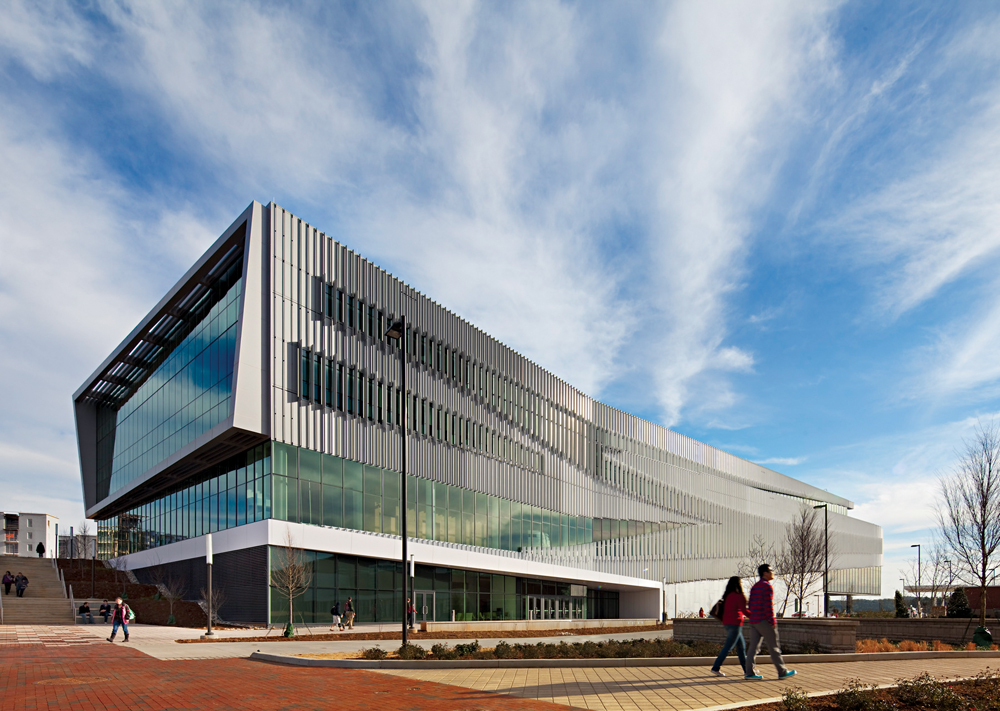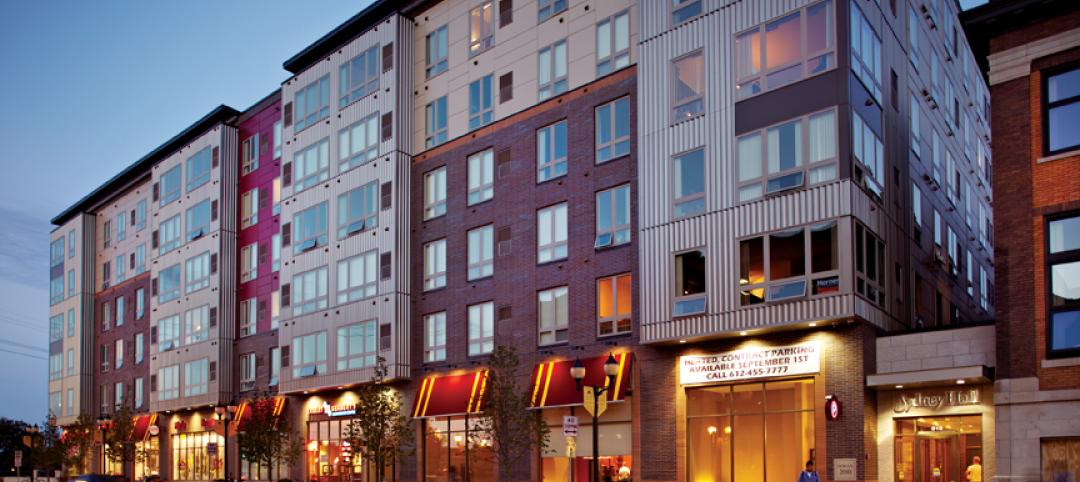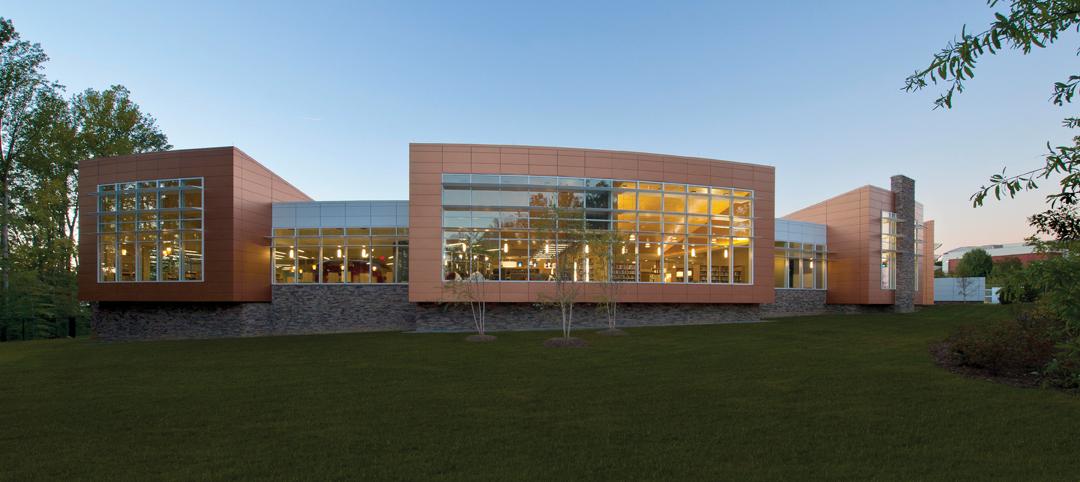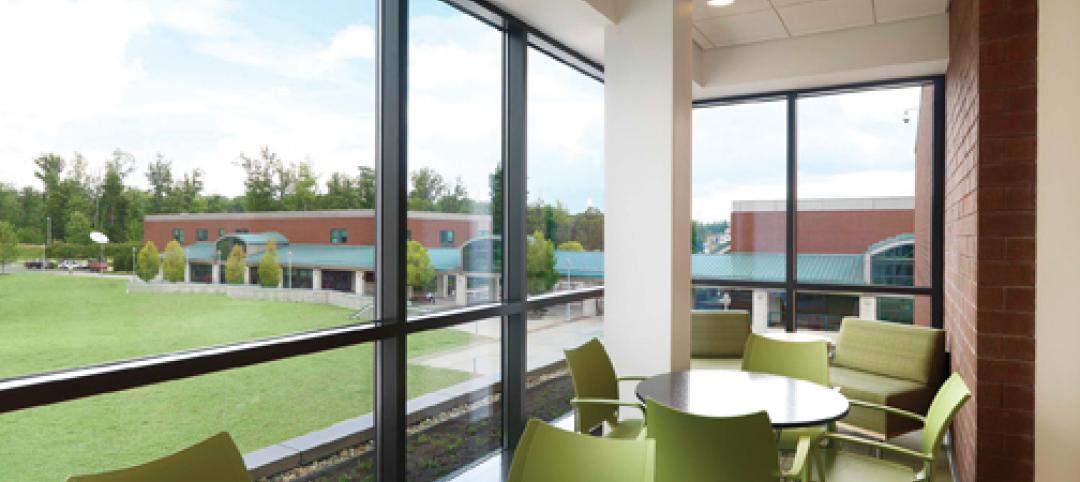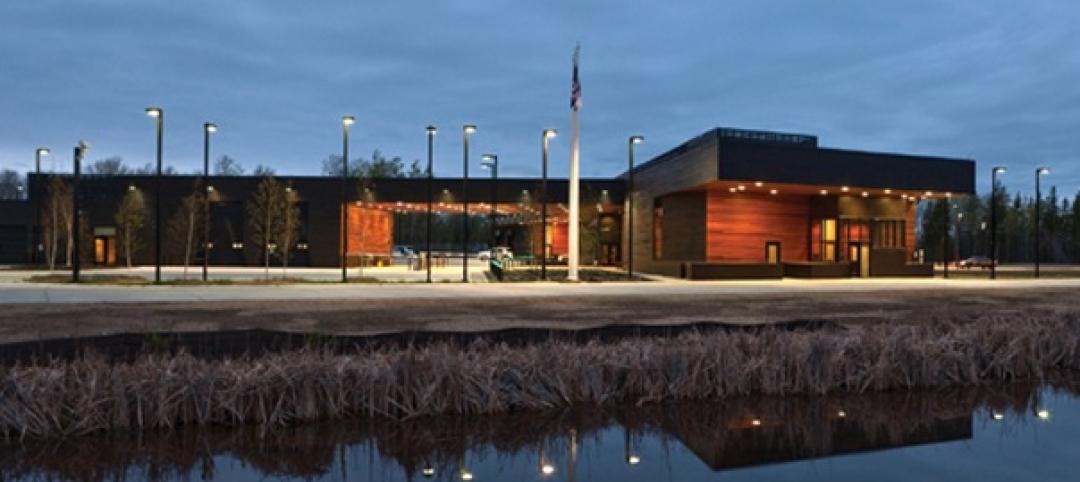Economic recovery has been slow, and the overall higher ed market is still fairly flat, according to a 2013 report by consultant Paul Abramson, using data from Dun and Bradstreet (http://bit.ly/ZiM6cQ).
Nevertheless, better investment performance is improving the mood of donors and easing some of the pressure on endowments. “The market is beginning to open up, with pent-up demand pushing projects to get funded and into design and construction,” says Steve Rhoades, Associate Principal and Client Executive at KJWW Engineering Consultants.
Recruitment pressure has convinced some clients to green-light capital projects. “One of the key drivers of growth is the need for colleges and universities to stay more competitive in amenities: more luxurious dorms, state-of-the-art athletic facilities, technologically advanced classrooms,” says Thomas Goemaat, President and CEO of Shawmut. Goemaat says his firm has seen a “significant and sustained uptick” in academic work in New England and the Tri-State region of New York, New Jersey, and Connecticut.
Large facilities that combine academic and medical objectives are capitalizing on the synergy between education, science, and clinical services. For instance, the University at Buffalo (N.Y.), whose UB2020 master plan has been simmering since 2004, will break ground this fall on its $375 million School of Medicine and Biomedical Sciences Building. At half a million square feet, the HOK-designed facility is the linchpin of UB’s plan to create a whole new Downtown Campus. The city will build a Metro station below the structure, and a children’s hospital (run by the nonprofit Kaleida Health) and privately owned medical office building will rise next door.
TOP UNIVERSITY ARCHITECTURE FIRMS
2012 University Revenue ($)1 Cannon Design $71,000,0002 Perkins+Will $49,726,5433 Stantec $36,704,0774 EYP $30,000,0005 SmithGroupJJR $25,600,0006 Gensler $22,140,0007 IBI Group $21,432,7128 Flad Architects $20,350,0009 Wight & Co. $18,072,20010 Sasaki Associates $16,865,404
TOP UNIVERSITY ENGINEERING FIRMS
2012 University Revenue ($)1 Affiliated Engineers $47,202,0002 URS Corp. $39,211,8523 AECOM Technology Corp. $33,000,0004 Buro Happold Consulting Engineers $28,695,0005 Burns & McDonnell $25,635,0006 STV $21,121,0007 Parsons Brinckerhoff $19,000,0008 Clark Nexsen $18,141,7909 Vanderweil Engineers $15,062,10010 KJWW Engineering Consultants $13,554,873
TOP UNIVERSITY CONSTRUCTION FIRMS
2012 University Revenue ($)1 Whiting-Turner Contracting Co., The $818,113,1402 Turner Corporation, The $701,340,0003 Skanska USA $437,058,2284 Structure Tone $354,907,9005 PCL Construction Enterprises $340,500,0756 Mortenson Construction $246,330,0007 Swinerton Builders $229,439,9508 DPR Construction $227,149,3779 Sundt Construction $225,748,51410 Austin Commercial $225,311,911
The partnership aspects of the UB project illustrate a trend toward creative public/private development. “There is a growing understanding that institutions can no longer afford to function independent of their host community—a change that has been driven in part by growing financial pressures,” says Mike Medici, AIA, Learning Practice Leader at SmithGroupJJR. “This is leading to an increase in community development partnerships as institutions seek to leverage their impact as ‘economic engines.’”
In Camden, N.J., Rowan University is finishing its $139 million Cooper Medical School education building—home of a new med school, the state’s first such project in more than 30 years. The curriculum emphasizes problem-based learning, with academic facilities tailored to group work plus hands-on simulations with robots and even a virtual reality CAVE. The project, designed by HDR, embodies higher ed’s current concern for programs that prepare students for a tough job market.
With thousands of traditional dorms still in use, the need for more modern residences also continues to generate work. Some responses have been dramatic, such as the 21-story Tree House just built by Suffolk Construction at the Massachusetts College of Art and Design, Boston. Amenities of the 493-bed apartment-style facility include a health center, café, and “Pajama Floor” where students can play games, watch TV, study, or work out while doing laundry. Hardin Construction (just acquired by DPR) recently delivered projects comprising nearly 2,000 beds for four academic clients in Georgia—all spurred by a desire to meet “modern consumer expectations,” according to Director of Higher Education Carlos Torres.
In another competitive strategy, some schools are replacing old-style student unions with recreation centers emphasizing wellness. Buildings may include student services offices, clinics, or classrooms for related subjects.
Auburn University at Montgomery (Ala.) positioned its 74,000-sf Wellness Center as a new front door for the entire campus. Constructed by BL Harbert International, the facility includes outdoor fields, two basketball courts, weight and cardio rooms, two multipurpose rooms, an aquatic center with outdoor spa, an indoor track, climbing wall, and juice bar, plus classrooms, lecture halls, and a lab for the Department of Physical Education and Exercise Science.
Finally, the American College & University Presidents’ Climate Commitment, now with 669 signatories, continues to influence construction. Some schools are eyeing net-zero and the Living Building Challenge for a variety of building types. And though central plants may not be glamorous, many clients now recognize the tantalizing ROI offered by improved infrastructure. In an extreme example, Rist-Frost-Shumway engineered a new 15,800-sf wood-biomass heating plant with cogeneration for Colby College in Waterville, Maine—a milestone in the school’s quest for carbon neutrality.
As in other sectors, energy performance of existing buildings is also becoming a high priority for higher ed. “The old piecemeal approach that advocates randomly adding sustainable applications won’t do the trick; more holistic building energy strategies are required,” says Vuk Vujovic, Director of Sustainable Design at Legat Architects.
Read BD+C's full Giants 300 Report
Related Stories
| Jan 21, 2011
Nothing dinky about these residences for Golden Gophers
The Sydney Hall Student Apartments combines 125 student residences with 15,000 sf of retail space in the University of Minnesota’s historic Dinkytown neighborhood, in Minneapolis.
| Jan 21, 2011
Revamped hotel-turned-condominium building holds on to historic style
The historic 89,000-sf Hotel Stowell in Los Angeles was reincarnated as the El Dorado, a 65-unit loft condominium building with retail and restaurant space. Rockefeller Partners Architects, El Segundo, Calif., aimed to preserve the building’s Gothic-Art Nouveau combination style while updating it for modern living.
| Jan 21, 2011
Sustainable history center exhibits Fort Ticonderoga’s storied past
Fort Ticonderoga, in Ticonderoga, N.Y., along Lake Champlain, dates to 1755 and was the site of battles in the French and Indian War and the American Revolution. The new $20.8 million, 15,000-sf Deborah Clarke Mars Education Center pays homage to the French magasin du Roi (the King’s warehouse) at the fort.
| Jan 21, 2011
Library planned for modern media enthusiasts
The England Run Library, a new 30,000-sf glass, brick, and stone building, will soon house more than 100,000 books and DVDs. The Lukmire Partnership, Arlington, Va., designed the Stafford County, Va., library, the firm’s fourth for the Central Rappahannock Library System, to combine modern library-browsing trends with traditional library services.
| Jan 21, 2011
Virginia community college completes LEED Silver science building
The new 60,000-sf science building at John Tyler Community College in Midlothian, Va., just earned LEED Silver, the first facility in the Commonwealth’s community college system to earn this recognition. The facility, designed by Burt Hill with Gilbane Building Co. as construction manager, houses an entire floor of laboratory classrooms, plus a new library, student lounge, and bookstore.
| Jan 21, 2011
Upscale apartments offer residents a twist on modern history
The Goodwynn at Town: Brookhaven, a 433,300-sf residential and retail building in DeKalb County, Ga., combines a historic look with modern amenities. Atlanta-based project architect Niles Bolton Associates used contemporary materials in historic patterns and colors on the exterior, while concealing a six-level parking structure on the interior.
| Jan 21, 2011
Research center built for interdisciplinary cooperation
The Jan and Dan Duncan Neurological Research Institute at Texas Children’s Hospital, in Houston, the first basic research institute for childhood neurological diseases, is a 13-story twisting tower in the center of the hospital campus.
| Jan 21, 2011
Music festival’s new home showcases scenic setting
Epstein Joslin Architects, Cambridge, Mass., designed the Shalin Liu Performance Center in Rockport, Mass., to showcase the Rockport Chamber Music Festival, as well at the site’s ocean views.
| Jan 21, 2011
GSA Recognizes the Best in Public Architecture
The U.S. General Services Administration recognized the best in public architecture and civilian federal workplaces at the 2010 GSA Design Awards in Washington, D.C. This year's 11 award winners showcase the federal government's commitment to cutting-edge architectural design and its focus on sustainability.
| Jan 20, 2011
Houston Dynamo soccer team plans new venue
Construction is scheduled to begin this month on a new 22,000-seat Major League Soccer stadium for the Houston Dynamo. The $60 million project is expected to be ready for the 2012 MLS season.


